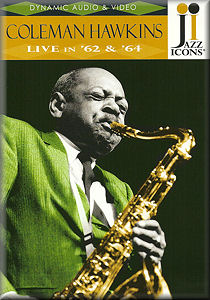Belgium, 1962
1. Disorder at the Border
2. Autumn Leaves
3. Lover Come Back to Me
4. Moonlight in Vermont
5. All The Things You Are
6. Ow!
Coleman Hawkins - Tenor sax
Georges Arvanitas - Piano
Jimmy Woode - Bass
Kansas Fields - Drums
England, 1964
7. Disorder at the Border
8. Lover Man, Stella By Starlight, The Girl from Ipanema
9. What Is This Thing Called Love
10. Stoned
11. September Song, What's New, Willow Weep For Me
12. Centerpiece
13. Caravan
Coleman Hawkins - Tenor sax
Harry "Sweets" Edison - Trumpet
"Sir" Charles Thompson - Piano
Jimmy Woode - Bass
"Papa" Jo Jones - Drums
This DVD contains two concerts which confirm Coleman Hawkins's stature
as the doyen of tenor saxophonists. The first session, recorded in
Belgium in 1962 at the Adolphe Sax Festival, has been newly discovered
and has not previously been issued. It features Hawkins simply with
a rhythm section, led by French pianist Georges Arvanitas. Arvanitas
is not as well-known as he deserves to be, although he was the first-choice
accompanist for many American musicians visiting Europe. He backs
the other players sensitively and contributes some well-constructed
solos. Jimmy Woode's bass provides a firm foundation for the quartet
(despite his tendency to speed up), and my only reservation about
this one-hour set is drummer Kansas Fields, whose theatrical style
of playing seems more designed to attract attention to him than to
respond helpfully to Coleman Hawkins. Several times, Fields's drumming
wrong-foots Hawk, and makes him uncertain where to enter.
Apart from this, the black-and-white footage is nice and clear, and
the sound is acceptable if occasionally a little fuzzy (for instance,
in the piano solo on Lover Come Back to Me). This session begins
with the same easy-swinging blues that opens the later set: Disorder
at the Border, a Hawkins composition. In this, Coleman exhibits
his fluent swing which is technically brilliant - but always at the
service of melody. Jimmy Woode's bass solo is rather too quiet and
Kansas Fields drum solo is the opposite - although it is interrupted
halfway through by Kansas having trouble with his bass-drum pedal.
Hawkins is undeterred but returns to improvising with extreme fluency.
Autumn Leaves lets Hawk show his paces in a ballad, where he
spins new melodies from the old thread. Arvanitas may look like a
bank clerk but he plays like an angel.
And so this pleasurable session continues until the closing Ow!,
which shows why the drumming is not always satisfactory. You can see
that the hi-hat cymbals are playing on the on-beat instead of the
usual offbeat. This sometimes unbalances the music - a fault which
is also clear in the lengthy exchange of fours between tenor sax and
drums, where the drummer sometimes seems to throw Coleman off-balance.
The second session - recorded at Wembley Town Hall for the BBC TV
series Jazz 625 - has a more satisfactory drummer in Jo Jones,
although the recording is poorly balanced, which can make the drums
sound too loud. The echoey acoustic doesn't help, either. However,
this is a more varied and interesting set than the previous one, as
it has the bonus of trumpeter Harry Edison, whose impassive face (and
disconcertingly Hitlerian hair) belies the blues feeling in his many
excellent solos. The pianist is "Sir" Charles Thompson,
whose accompanying and solos are consistently elegant.
This programme is unusual in that it includes not one but two ballad
medleys. The first one begins with Hawkins strolling at a leisurely
pace through Lover Man. Then Charles Thompson chooses his notes
with discretion in Stella by Starlight, and Harry Edison
climaxes the set with an unexpected The Girl from Ipanema on
muted trumpet, which virtually steals the show.
The up-tempo What Is This Thing Called Love? includes a subtle
solo from Jo Jones using brushes. Stoned proves that Coleman
Hawkins could be as muscular as any tenor-saxist. This is followed
by another ballad medley, in which Harry Edison shines again with
Willow Weep for Me. Edison wrote Centerpiece, a nice-and-easy
blues which includes a magisterial solo from Hawkins. The concert
ends with Caravan, which gives the smiling Jo Jones the chance
to show off with a long drum solo. It is imposingly faultless, as
he attacks the drums with hands as well as sticks, and varies the
dynamics to great effect.
With more than two hours of footage., this DVD is yet another very
desirable release in the Jazz Icons series.
Tony Augarde
